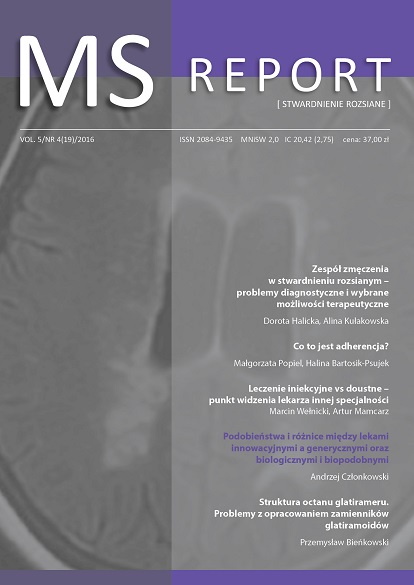Co to jest adherencja? Artykuł przeglądowy
##plugins.themes.bootstrap3.article.main##
Abstrakt
Stwardnienie rozsiane (MS, multiple sclerosis) to przewlekła, zapalno-degeneracyjna choroba ośrodkowego układu nerwowego o podłożu autoimmunologicznym. Chociaż pozostaje nieuleczalna, to standardowo stosuje się leki modyfikujące przebieg choroby (DMT, disease-modifying therapies). We wszystkich DMT niezbędne jest regularne i długoterminowe leczenie zgodnie z określonym schematem dawkowania. Dlatego pełne zastosowanie wymogów terapii staje się ważnym wyzwaniem dla maksymalizacji efektów leczenia. Światowa Organizacja Zdrowia definiuje adherencję jako akceptację reguł zalecanej terapii pozwalającą osiągnąć korzyści z jej stosowania. Adherencja w leczeniu zapewnia lepsze kliniczne i ekonomiczne rezultaty, zmniejsza ryzyko hospitalizacji, wystąpienia rzutu choroby i koszty opieki medycznej w MS. W doniesieniu tym oceniano poziom adherencji terapeutycznej i czynniki wpływające na jej wzrost u chorych na MS.
##plugins.themes.bootstrap3.article.details##
Copyright © by Medical Education. All rights reserved.
Bibliografia
2. Caporro M., Disanto G., Gobbi C. et al.: Two decades of subcutaneous glatiramer acetate injection: current role of the standard dose, and new high-dose low-frequency glatiramer acetate in relapsing–remitting multiple sclerosis treatment. Patient Prefer. Adherence 2014; 8: 1123-1134.
3. Hansen K., Schüssel K., Kieble M. et al.: Adherence to Disease Modifying Drugs among Patients with Multiple Sclerosis in Germany: A Retrospective Cohort Study. PLoS ONE 2015; 10(7): e0133279.
4. Devonshire V., Lapierre Y., Macdonell R. et al.: The Global Adherence Project (GAP): a multicenter observational study on adherence to disease-modifying therapies in patients with relapsing-remitting multiple sclerosis. Eur. J. Neurol. 2011; 18: 69-77.
5. Halpern R., Agarwal S., Borton L. et al.: Adherence and persistence among multiple sclerosis patients after one immunomodulatory therapy failure: retrospective claims analysis. Adv. Ther. 2011; 28(9): 761-775.
6. Tan H., Cai Q., Agarwal S. et al.: Impact of adherence to disease-modifying therapies on clinical and economic outcomes among patients with multiple sclerosis Adv. Ther. 2011; 28(1): 51-61.
7. Patti F.: Optimizing the benefit of multiple sclerosis therapy: the importance of treatment adherence. Patient Prefer. Adherence 2010; 4: 1-9.
8. Zettl U.K., Bauer-Steinhusen U., Glaser T. et al.: Adherence to long-term interferon beta-1b injection therapy in patients with multiple sclerosis using an electronic diary. Adv. Ther. 2016; 33: 834-847.
9. Bergvall N., Petrilla A.A., Karkare S.U. et al.: Persistence with and adherence to fingolimod compared with other disease-modifying therapies for the treatment of multiple sclerosis: a retrospective US claims database analysis. J. Med. Econ. 2014; 17(10): 696-707.
10. Menzin J., Caon C., Nichols C. et al.: Narrative review of the literature on adherence to disease-modifying therapies among patients with multiple sclerosis. J. Manag. Care Pharm. 2013; 19(1 supl. A): S24-40.
11. Zagmutt F.J., Carroll C.A.: Meta-analysis of adverse events in recent randomized clinical trials for dimethyl fumarate, glatiramer acetate and teriflunomide for the treatment of relapsing forms of multiple sclerosis. Int. J. Neurosci. 2015; 125(11): 798-807.
12. Lugaresi A., di Ioia M., Travaglini D. et al.: Risk-benefit considerations in the treatment of relapsing-remitting multiple sclerosis. Neuropsychiatr. Dis. Treat. 2013; 9: 893-914.
13. Devonshire V.A., Feinstein A., Moriarty P.: Adherence to interferon β‑1a therapy using an electronic self‑injector in multiple sclerosis: a multicentre, single‑arm, observational, phase IV study. BMC Res. Notes 2016; 9: 148.

